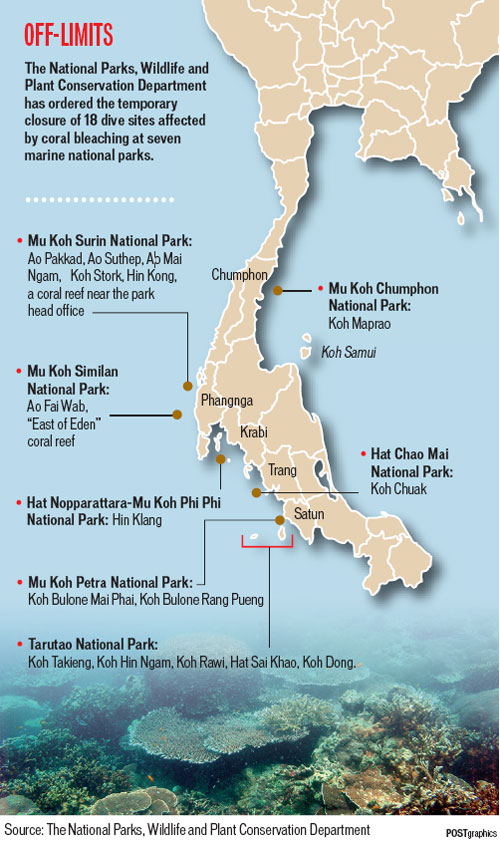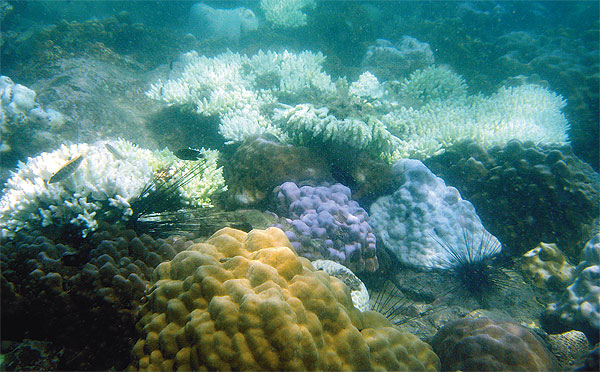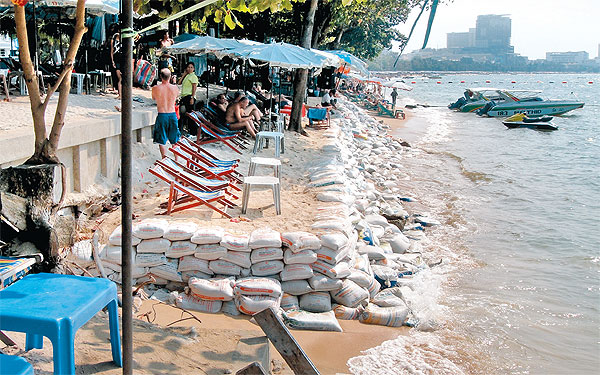Debatemne: Thai-Dk Din debat side :: Dykker paradis lukkers måske
Oprettet af eneber d. 17-01-2011 13:01
#1
det måtte jo komme før eller siden nu snakker de om at lukke to dykker områder
koralerne er næsten ødelagt af forurening og den globale opvarmning
sakset fra The Nation
POLLUTION AND GLOBAL WARMING
Diving paradises may be closed
By The Nation
The Department of Marine and Coastal Resources is seeking the closure of two diving paradises, the Similan and Surin national parks after the coral there was found suffering from bleaching.
The scope of the corals destroyed from the bleaching has been wide and unless proper measures are issued, more coral would be destroyed by the phenomenon, said department director general Kasemssan Jinnawaso on Monday.
"The damage found on the coral for now is vast, probably the worst in history and certainly more than when The tsunami hit this area in 2004. The species affected are the Staghorn, Ring, Double Star and Mountain coral," Kasemsan said.
His department has already submitted a request to the National Parks, Wildlife and Plants Conservation Department to close parts of Similan and Surin National Parks to prevent any further damage to the coral.
A cause of the coral bleaching is the rising temperature of the sea water, which has reached 30 Celsius since the middle of last year, he said, adding that waste and pollution from diving boats are also contributing to the phenomenon.
"Many divers are also contributing to the damage as they step on the coral," he said.
Surveys of the sites between September and December 2010 showed that 93.6 per cent of the coral at Surin Nua Island had died from the bleaching while almost 100 per cent of the reef near Mae Yai Bay had died.
Referring to Phi Phi, Phi Phi Don and Phi Phi Leh islands, Kasemsan said the coral there was also damaged by bleaching in vast areas, probably about 90 per cent of the reef.
http://www.nation...46548.html
Redigeret af eneber d. 17-01-2011 13:01
Oprettet af FCK d. 17-01-2011 14:49
#2
hvor skal vi turisterne så svømme og dykke
når vi ikke er i baren ((7))
er der noget natur tilbage om få år jeg tvivler:o vi mennesker er gode til at ødelægge tingene
Oprettet af pensionisten d. 21-01-2011 01:07
#3
Nu er det ikke mere måske, 18 dykker steder lukkes i op til 14 måneder.

Over 80% of the coral at each diving site had been damaged, National Parks, Wildlife and Plant Conservation Department chief Sunan Arunnoparat said yesterday.
Bleaching, or a whitening of coral as it loses its natural pigment, is caused by a rise in sea temperatures which has been linked to global warming. The dive sites which have been closed are in seven marine national parks.
They are the Hat Chao Mai National Park in Trang, Mu Koh Petra and Tarutao national parks in Satun, Mu Koh Chumphon National Park in Chumphon, Hat Nopparat Thara-Mu Koh Phi Phi National Park in Krabi, and Mu Koh Surin and Mu Koh Similan national parks in Phangnga.
The coral bleaching, which has been growing more serious since April, is said to be the worst in 20 years.
Up to 90% of coral in the Gulf of Thailand and the Andaman Sea has been bleached.
The department chief said he could not say how long the dive sites would be closed but diving activities probably would be banned until the end of the monsoon season in October.
Marine national parks would be closed for six months during the monsoon season.
Mr Sunan said curbs would be imposed on tourist visits to some sites, and public awareness of marine life conservation would be promoted in other measures to deter bleaching.
A task force will monitor the situation and issue measures to speed up coral rehabilitation, he said.
Praput Khorpetch, vice-president of the Phangnga Tourism Association, said the association was willing to cooperate with government efforts to protect marine life.
"We don't want to see just a closure of national parks to rehabilitate coral.
In fact, we want to see the government and private tourism operators work together to find a long-term solution," Mr Praput said.
"The Marine and Coastal Resources Department should not blame just the tourism sector for this problem. We received the message and have made an effort to limit the number of tourists but we don't have the power to do that. The government should impose a strict law on this issue."
Suchart Sirankanokkul, president of the Thai Hotels Association Southern Charter, suggested the government set up a meeting with tourism operators in the affected areas to discuss solutions to the problem.
http://www.bangko...oral-reefs
Oprettet af pensionisten d. 23-01-2011 00:28
#4
Coral 'needs years' to recover
EXPERT SAYS CLOSING DIVE SITES ONLY ONE MEASURE OF MANY NEEDED TO BATTLE BLEACHING
En lille opfølgning fra tour operatørerne der nu er begyndt at klage over den kommende manglende indtjening, og nu det er Thailand, har de meget at skulle have sagt !!
Closing popular diving sites will provide only short-term relief to the problem of coral bleaching, but cost the tourism industry millions of baht a year, industry experts say.

The Marine and Coastal Resources Department is pressing ahead with a plan to close 10 popular diving sites in five provinces to limit the impact of tourism on severely damaged coral.
The sites attract about one million tourists a year, and could be closed for up to 14 months.
But diving operators say tourism is but one cause of the bleaching phenomemon, and if the diving sites are closed for as long as proposed, taxpayer help may be needed to keep some companies alive.
"Diving companies are being singled out for blame, when the main cause is a warming of sea temperatures," said one disgruntled company head.
Some coral reefs may need several years to recover, not just a matter of months, they say.
WHITE OUT: No easy solution to bleaching.
Veteran marine biologist Thorn Thanrongnawasawat said closing the coral reefs will give the coral time to recover, but more permanent solutions are still needed.
He said man-made dive sites should be developed to help relieve pressure on popular coral reefs. Artificial reefs should also be produced, and coral transplanting considered.
"Closing the dive sites gives the coral an opportunity to revive.
"This does not mean that the coral will revive automatically, however. It really depends on how we tackle other factors that may affect them such as water pollution," said Dr Thorn, who heads the department of marine science at Kasetsart University's faculty of fisheries.
Scientists believe the main cause of the bleaching is the warming of the oceans, which forces zooxanthallae, an algae which coexists with the coral and gives it colour, to extract itself from the coral. Many coral reefs in the Andaman Sea have turned a pale yellow or white colour and gradually died.
The diving sites facing temporary closure to allow coral to recover from bleaching are located in Hat Nopparattara-Mu Koh Phi Phi National Park in Krabi; Mu Koh Surin Marine National Park (Phangnga); Mu Koh Rang National Park (Trat); Koh Tao (Surat Thani); and Koh Pai and Koh Kang Kao (Chon Buri).
Defending the proposed closure, the department says that without immediate action, the corals may be lost permanently, which would cause even more economic damage.
Dr Thorn said the closures which stand to affect tourists the most are in Surin and Tarutao Marine National Parks, where up to 80% of corals have bleached.
Some tourism operators say the extent of the damage has been exaggerated.
Fabian Teruel, general manager of Khao Lak Scuba Adventure and a member of the Khao Lak Diving Operator Forum in Phangnga province, said news about coral bleaching has hurt local businesses.
Many tourists mistakenly believed that coral leaching was widespread.
At some sites, such as the Similan Islands, bleaching had affected only only a few dive sites.
Customers had asked about the closures, and some threatened to cancel bookings.
"We can still dive in several spots. We want to make clear that some islands such as Surin may have been affected, but there are several other places like the Similan islands which have not been affected much by the phenomenon," Mr Teruel said.
The government was wrong to blame divers for destroying coral reefs.
Most divers were environmentally conscious, and would not try to harm the coral.
Jannee Jandamneornpong, manager of the Phi Phi Scuba Diving Centre, said operators were willing to cooperate with the closure but the government should come up with measures to help them survive.
Tourism businesses on the island had yet to recover fully since the 2004 tsunami.
"We are business operators, but we are also concerned for the environment. Without a quality environment, we cannot survive," said Ms Jannee.
http://www.bangko...to-recover
Oprettet af yindee d. 24-01-2011 11:30
#5
alt bliver ødelagt nu er det også galt med strandene i bade byen

Pattaya Beach could disappear in 5 years
Pattaya Beach is facing a severe sand erosion problem, prompting business owners to stack sandbags around their deckchairs to keep them from being washed away by waves. The erosion has significantly reduced the beach area over the past 10 years, experts say.
The science faculty's head of disaster studies, Thanawat Jarupongsakul, has released a paper which shows erosion at the beach is now "critical".
The erosion is caused mainly by changes in wave patterns reducing deposits of sand on the beach and this is being exacerbated by increased beach use.
Pattaya Beach covered 96,000 square metres (about 60 rai) in 1952, with the distance to the water about 36 metres. The beach area had fallen to 50,500 square metres (31 rai) by 2002, with 18.7 metres to the shoreline.
"The latest survey found the beach width had dropped sharply to just four to five metres," Prof Thanawat said.
"Without serious action, Pattaya Beach will disappear within five years."
Prof Thanawat said Chulalongkorn University's Aquatic Resources Research Institute, its science faculty and the Marine Department of Transport Ministry had together prepared a plan to counter the erosion.
This involves 200,000 cubic metres of sand being filled along the 4.48 kilometres of the beach to expand its width to 30 metres.
Oprettet af sol d. 27-01-2011 02:34
#6
det lyder usandsynligt men se lige her det er mange penge staten har ikke har fået i kassen
Officials pocket Bt1 billion a year in admission fees
Operators of diving tours and tour guides have exposed corruption at marine national parks in the Andaman Sea.
Graft in the admission fee system is believed to have cost the government Bt1 billion in lost revenue each year.
"The problem has been going on for many years already," the owner of a famous diving-tour company in Phuket said yesterday, on condition of anonymity.
He said Maya Bay on Phi Phi Island attracted between 50 and 100 boats a day from November 1 to May 30. This meant the number of tourists could be as many as 1,000 per site per day.
The admission fee was Bt400 per person but corrupt officials offered a 30-per-cent discount if operators did not ask for receipts.
"We have alerted relevant authorities before but this corrupt practice continues."
http://www.nation...47092.html
Oprettet af pensionisten d. 28-01-2011 00:44
#7
Nu er der fokus på dyrkning af koraller for at hjælpe på nedbrydninggen.
http://www.nation...47380.html
In order to slowdown the deterioration of coral, marine scientists from Chulalongkorn University are taking part in a project to help the reproduction of coral, a seminar at CU's Faculty of Science was told yesterday.
Instead of depending on natural production, CU scientists extract cells to create coral larvae, look after them for a year or two before they are ready for the sea, Assoc Prof Suchana Chawanich said, adding that this technique was first achieved in Thailand by the CU faculty.
Coral bleaching has been extensive along the coastal areas on the side of the Andaman Sea since April, before it was reported in the Gulf of Thailand, in the Sattahip area in Chon Buri at around May, where 10 per cent of the overall coral population had deteriorated. By now, about 60 per cent of the coral in the Gulf has been affected.
The new reproduction technique might not create huge quantities of coral, though it has increased the survival rate of new corals and resulted in a greater diversity and variety in breeds.
"Genetic diversity is useful in increasing the resistance of corals to environmental changes and the technique is an appropriate alternative to slowing down coral bleaching," Suchana said.
Coral normally reproduce in a nonsexual manner the year round, though during an unspecified period each year, they conjugate.
There are more than 10 coral breeds successfully undergoing reproduction assisted by CU marine scientists after a project with cooperation from the Navy and under a patronage of HRH Maha Chakri Sirindhorn, began in 2006. The survival rate of young corals through humanassisted reproduction after a sixmonth postbirth period is now 50 per cent compared to 0.01 in the nature, said Suchana.


